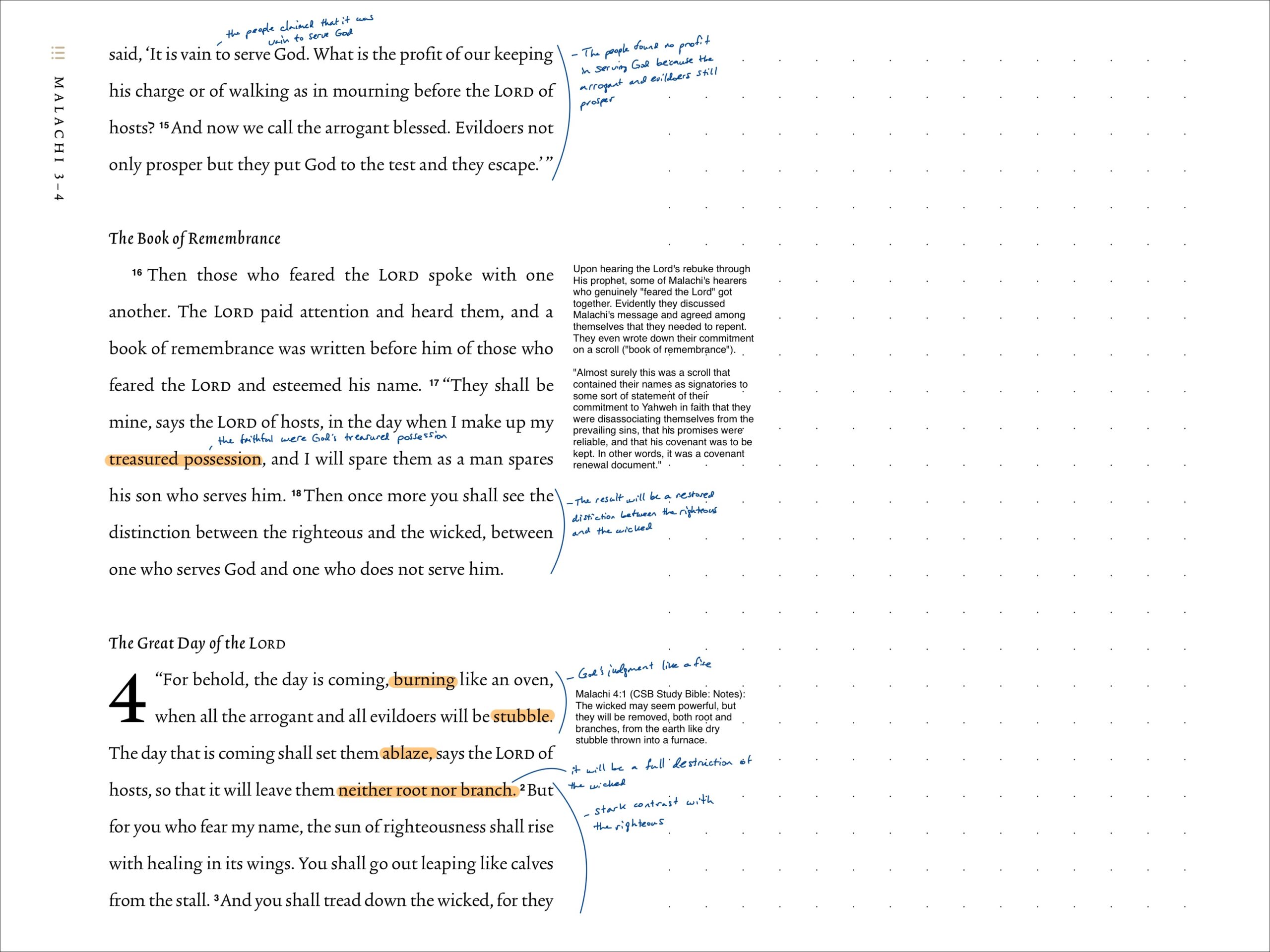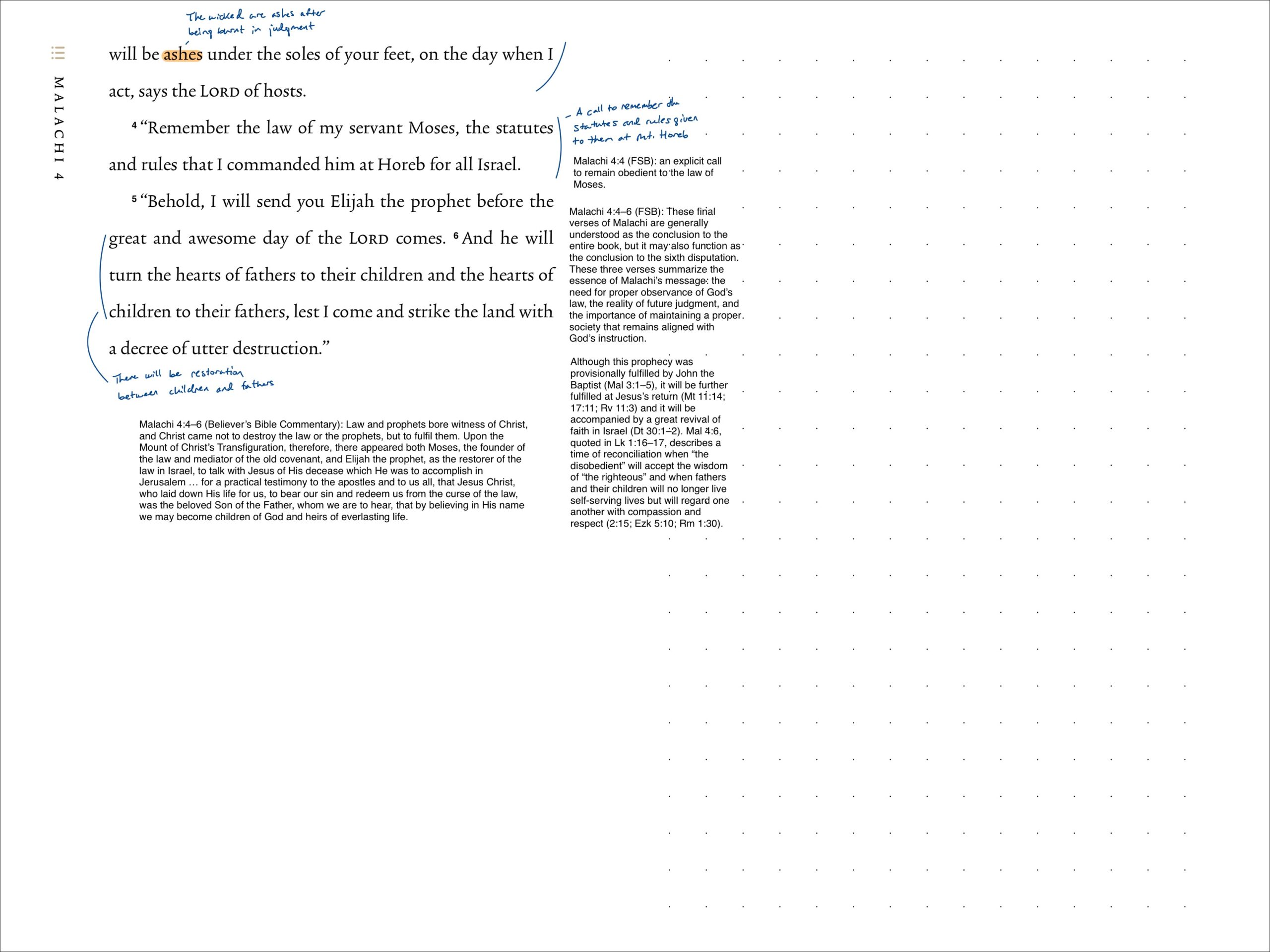| Date | Version | Reading Plan |
|---|---|---|
| @December 30, 2023 | ESV (2016) | ESV Prophets Plan 2023 |
Pericopes
- The Great Day of the Lord
Notes/Application
The final chapter of the book of Malachi and of the OT opens with a decree that a day is coming, “burning like an oven, when all the arrogant and evildoers will be stubble”, setting them “ablaze”, leaving “neither root nor branch.” (Mal. 4:1). This would have been a sharp response to how the people saw evildoers prospering, testing God and escaping in Mal. 3:15. God through Malachi makes clear that the unsaved wicked will be dealt with severely and that His people needed to repent. The people are then called to obedience and to remember the statutes and rules given to them through Moses. God will send them Elijah before the awesome day of the Lord comes and he will cause restoration of relationship between fathers and children. This prophecy was provisionally fulfilled by John the Baptist and further fulfilled at Jesus’ return (Matt. 11:14; Matt. 17:11; Rev. 11:3).
Although being such a short chapter, there is so much going on here. First, Malachi dispels any notion that the wicked will go unpunished. Whatever success or prosperity they have in this life will come to an end. There will be a day of reckoning from which there is no escape. God will so thoroughly purge the wicked that they will be entirely consumed, like a shrub thrown into a hot fire, burned from root to branch. God as a consuming fire is a significant theme within Scripture (ex. Deut: 4:24 and Heb. 12:29).
Next is the bridge made between Testaments in the speaking of Moses and Elijah. Since Malachi was the final prophetic book in the OT, the people would have been looking for Elijah as the predecessor of the “awesome day of the LORD”. This provides context to several references to Elijah in the NT and to the disciples’ answer to Jesus’ question in Matt. 16:13 when He asks “Who do people say that the Son of Man is?”. Their response is, “Some say John the Baptist, others say Elijah, and others Jeremiah or one of the prophets.” (Matt. 16:14). Then, later in Matthew, Jesus makes a profound statement that Elijah had indeed already come but they did not recognize him (referring to John the Baptist). The profundity of this lies not with identifying John the Baptist as the expected Elijah but that Jesus was the One who came after him, the One whose sandal strap John was unworthy to untie and Who would baptize with the Holy Spirit and fire (Luke 3:16; John 1:27).
Extending further into the references of Moses and Elijah in Malachi and the NT is what happens at Jesus’ transfiguration (Matt. 17; Mark 9; Luke 9). Keil and Delitzsch’s commentary expounds on this and also beautifully bind the Testaments together. I’ll quote it here in its entirely to be the final thought:
Law and prophets bore witness of Christ, and Christ came not to destroy the law or the prophets, but to fulfil them. Upon the Mount of Christ’s Transfiguration, therefore, there appeared both Moses, the founder of the law and mediator of the old covenant, and Elijah the prophet, as the restorer of the law in Israel, to talk with Jesus of His decease which He was to accomplish in Jerusalem … for a practical testimony to the apostles and to us all, that Jesus Christ, who laid down His life for us, to bear our sin and redeem us from the curse of the law, was the beloved Son of the Father, whom we are to hear, that by believing in His name we may become children of God and heirs of everlasting life.
Scripture Journal Notes
Commentaries & Resources Used
- ESV Study Bible. (Wheaton, IL: Crossway, 2008)
- Faithlife Study Bible (Lexham Press, 2016)
- Believer’s Bible Commentary (Thomas Nelson, 2016)
- CSB Study Bible Notes (Holman Bible Publishers, 2017)
- Matthew Henry’s Commentary on the Whole Bible (Guardian Press, 1976)
- The Bible: A Reader’s Guide (Sterling Publishing, 2011)
- The Infographic Bible (Zondervan, 2018)
- ESV Digital Scripture Journal (Crossway, 2019)
- Constable’s Notes

